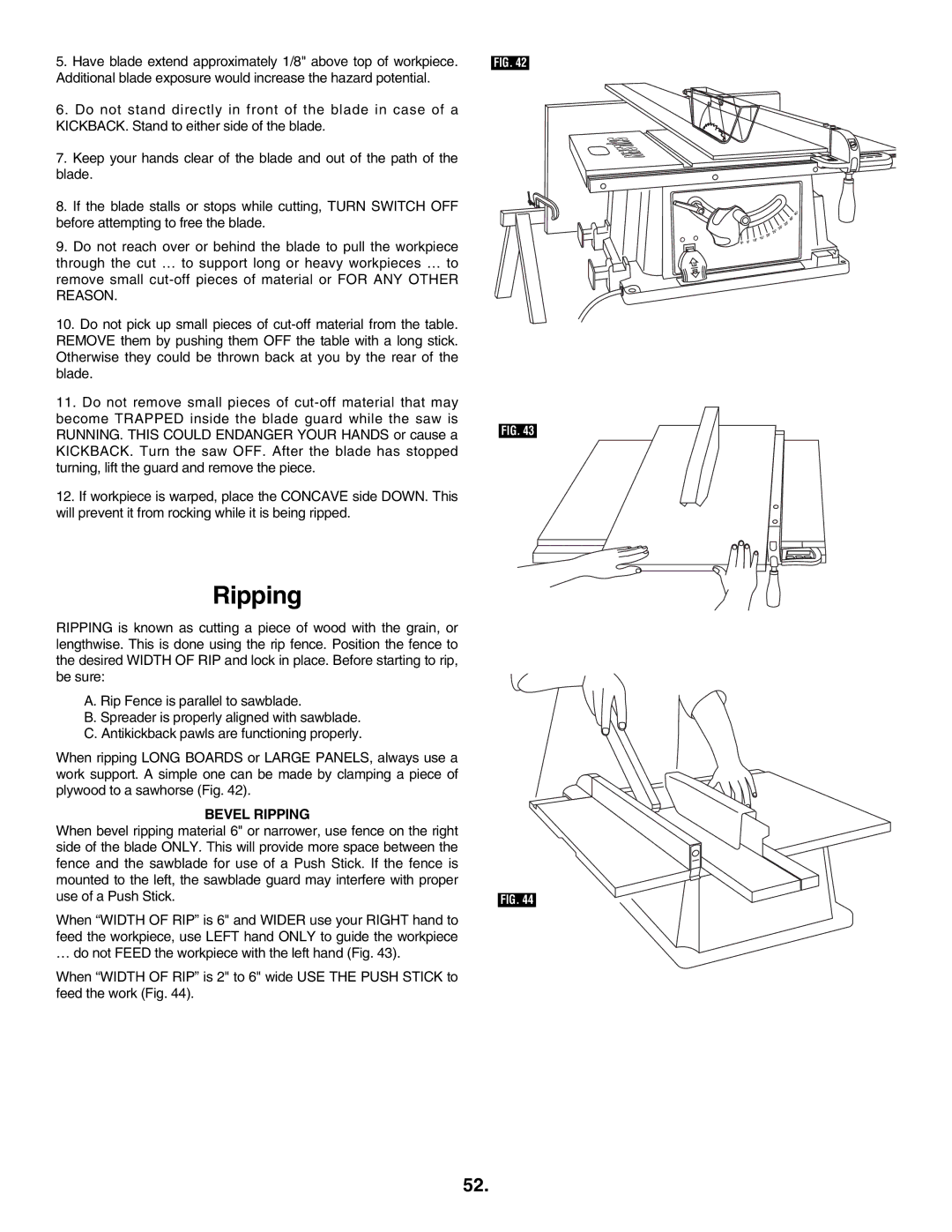
5. Have blade extend approximately 1/8" above top of workpiece. | FIG. 42 |
| |
Additional blade exposure would increase the hazard potential. |
|
|
|
6. Do not stand directly in front of the blade in case of a |
|
|
|
KICKBACK. Stand to either side of the blade. |
|
|
|
7. Keep your hands clear of the blade and out of the path of the |
|
|
|
blade. |
|
|
|
8. If the blade stalls or stops while cutting, TURN SWITCH OFF |
|
|
|
before attempting to free the blade. |
|
|
|
9. Do not reach over or behind the blade to pull the workpiece |
|
|
|
through the cut … to support long or heavy workpieces … to |
|
|
|
remove small |
|
|
|
REASON. |
|
|
|
10. Do not pick up small pieces of |
|
|
|
REMOVE them by pushing them OFF the table with a long stick. |
|
|
|
Otherwise they could be thrown back at you by the rear of the |
|
|
|
blade. |
|
|
|
11. Do not remove small pieces of |
|
|
|
become TRAPPED inside the blade guard while the saw is |
|
|
|
RUNNING. THIS COULD ENDANGER YOUR HANDS or cause a |
| FIG. 43 | |
|
|
| |
KICKBACK. Turn the saw OFF. After the blade has stopped |
|
|
|
turning, lift the guard and remove the piece. |
|
|
|
12. If workpiece is warped, place the CONCAVE side DOWN. This |
|
|
|
will prevent it from rocking while it is being ripped. |
|
|
|
Ripping
RIPPING is known as cutting a piece of wood with the grain, or lengthwise. This is done using the rip fence. Position the fence to the desired WIDTH OF RIP and lock in place. Before starting to rip,
be sure: |
|
A. Rip Fence is parallel to sawblade. |
|
B. Spreader is properly aligned with sawblade. |
|
C. Antikickback pawls are functioning properly. |
|
When ripping LONG BOARDS or LARGE PANELS, always use a |
|
work support. A simple one can be made by clamping a piece of |
|
plywood to a sawhorse (Fig. 42). |
|
BEVEL RIPPING |
|
When bevel ripping material 6" or narrower, use fence on the right |
|
side of the blade ONLY. This will provide more space between the |
|
fence and the sawblade for use of a Push Stick. If the fence is |
|
mounted to the left, the sawblade guard may interfere with proper |
|
use of a Push Stick. |
|
FIG. 44 | |
When “WIDTH OF RIP” is 6" and WIDER use your RIGHT hand to |
|
feed the workpiece, use LEFT hand ONLY to guide the workpiece |
|
… do not FEED the workpiece with the left hand (Fig. 43). |
|
When “WIDTH OF RIP” is 2" to 6" wide USE THE PUSH STICK to |
|
feed the work (Fig. 44). |
|
0º
5º
10º
15º
20º
25º
º 30
35º
40º
45º
52.
